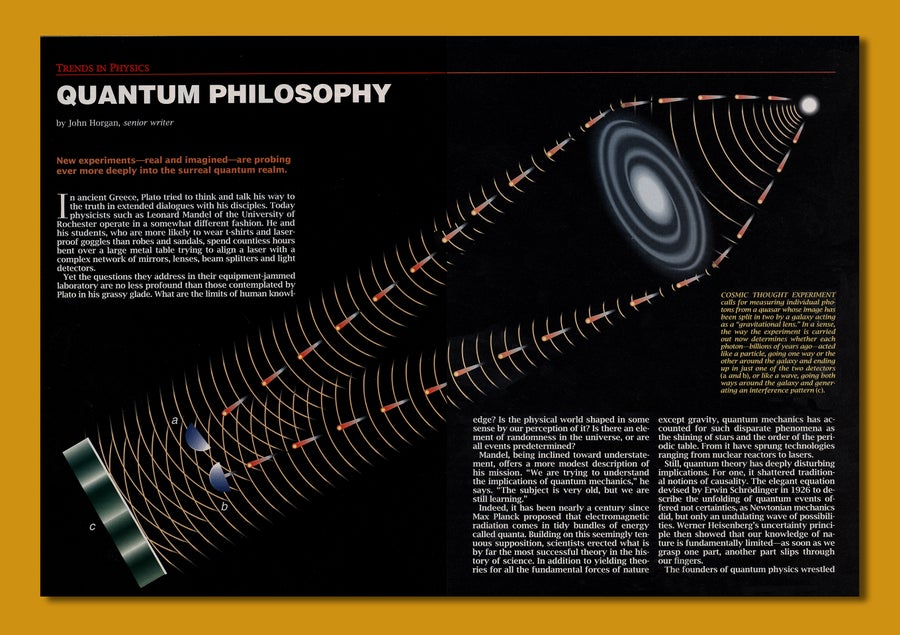This year is the International Year of Quantum Science and Technology, according to UNESCO, marking 100 years since quantum mechanics was proposed. The theory hardly needed the extra publicity, though.
Look at any science magazine’s trending articles and there’s a good chance quantum stories will be among the top rankings. Cute animals aside, quantum physics might be science fans’ favorite cover story. But why?
I’m a science journalist with a physics degree, and this question fascinates me. It’s not obvious why the public is so enraptured with quantum physics, a field that is notoriously difficult to explain and even more challenging to connect to everyday experience. Yet what I call the “quantum fixation” has prevailed almost since the theory originated.
On supporting science journalism
If you’re enjoying this article, consider supporting our award-winning journalism by subscribing. By purchasing a subscription you are helping to ensure the future of impactful stories about the discoveries and ideas shaping our world today.
I had the opportunity to research the perennial popularity of quantum physics for my master’s dissertation in science communication, and I chose to dive into the archives of Scientific American in search of an answer. As the U.S.’s oldest continually published magazine—180 years now—it is one of the few publications old enough to have witnessed the birth of the quantum age and has helped introduce it to the public.
Over the course of a few months, I searched the archives for articles with any mention of the word quantum in the past 100 years of print coverage. In analyzing who wrote these articles, what they chose to write about and how they conveyed the often-confusing quantum world to general readers, I hoped to discover what the public found so compelling about quantum physics.
It turns out that what draws us to quantum physics are the same things its founders found repulsive about it.
Quantum Beginnings
You have to feel sorry for quantum mechanics sometimes. The scientists that founded it were among its harshest critics. In 1905 Albert Einstein first popularized the word quanta (derived from the Latin term for “how much”) to describe light as composed of discrete packets or bundles of energy known as photons.
At the beginning, quantum theory was just the simple idea that energy came in these discrete units. But even that notion was polarizing because experiments had already shown that light behaved, in many situations, like a wave.
Even then, established scientists struggled to communicate quantum ideas to a general audience. Quantum theory was a significant departure from simple, realist notions of science where we have a straightforward correspondence between the words we use and the objects we’re referring to.
Newton’s first law of motion, for instance, describes how an object moves in a straight line unless an outside force acts upon it. This mass exists as a real entity with clearly defined and consistent properties we can measure.
But enter the quantum world. When we describe the behavior of light with the same equations we use to describe waves, does that mean light is a wave the same way an earthquake or ripple in the water is? If so, how can it also be particle?
Furthermore, in this world, direct causal relationships, such as Newton’s laws of motion, are rewritten into laws of probability. Even the scientists who wrote the laws of quantum mechanics struggled to interpret them.
Physicist John Gribbin, author of the 1984 book In Search of Schrödinger’s Cat: Quantum Physics and Reality, covered this early period of turmoil. “I think part of quantum mechanics’ appeal was that it was incomprehensible, and so it was sort of like magic,” Gribbin says.
In a 1949 article celebrating Einstein’s life, quantum theory was even described as “heresy” by British mathematician and physicist Banesh Hoffmann. The word reflects scientists’ discomfort with the notion that a particle could be in two places at once. Einstein himself despised the probabilistic nature of the theory that he made vital contributions to, famously saying, “God does not play dice.”
The Quantum Age Is Here
The quantum’s controversy and lack of clarity might have contributed to its early popularity, but that limelight would pale in comparison to the attention it received in the next era. The volume of quantum coverage in Scientific American more than tripled between 1960 to 1980 compared with the 20 years preceding it. Much of this coverage was written by a new generation of researchers who were trained in quantum theory during their postgraduate studies.
During these years, government investment in science grew as the U.S. raced against the Soviet Union to pull off unprecedented feats of innovation. Inventions based on the insights of quantum mechanics, such as atomic clocks and the first lasers and semiconductors, also appeared.
These first quantum technologies hardly seem very “quantum” to people today, who have grown used to them in everyday life. Lasers found their way into CD players, barcode scanners and office printers, and many of us now own thousands of semiconductors in the form of a home computer.
This assumption that anything mundane and familiar, by definition, cannot be quantum also shows up in Scientific American coverage. Over the years the magazine became less and less likely to describe computer chips or lasers as fundamentally “quantum” technologies. In contrast, writers tended to describe the quantum world as “strange,” “bizarre” and “surreal.”

Of course, these are fair adjectives when it comes to quantum theory. The quantum world challenges our basic intuitions and seems to upend everything we thought we knew about how the world works. By the 1990s, quantum articles focused on exploring the fundamental nature of reality. Pieces canvased the idea that the universe is composed of tiny vibrating strings and that quantum mechanics causes it to multiply into an uncountable number of branching universes, among other wild concepts.
My foray into Scientific American’s archives showed me that there is no single thing that defines the quantum world. It is not just the discrete energy levels of Einstein’s photons, or the wave function that reduces objects to probabilities or the nonlocality and questionable reality of the universe. Instead quantum mechanics casts a wide net over the realm of things we do not fully understand. And therein lies its appeal: though part of us enjoys the comfort of the familiar, the enduring popularity of quantum science shows that humans love feeling challenged, destabilized and mystified about the world we live in.


